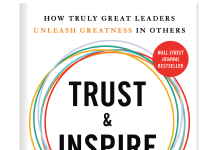My latest book on entrepreneurship, “The Entrepreneurial Attitude,” opens with: “What do Mark Cuban, Steve Case, Sanjay Gupta, Donna Shalala, and Christina Aguilera all have in common? They are all Junior Achievement alumni who developed an entrepreneurial attitude about their life’s work!”
The book updates our three decades of research on the practices of the world’s great entrepreneurs: Sense of Mission, Customer/Product Vision, High-Speed Innovation, and Self-Inspired Behavior—and then brings those proven practices to life through interviews with 70 high-achieving JA alumni across 35 countries. The book also describes the three broad requirements every entrepreneur has to have in place to be successful: A Bit of Money, A Bit of Knowledge, and an Entrepreneur-Friendly Culture. It concludes with a series of applications titled “My Start-up Action Plan.” For Training magazine readers, we’ve excerpted from the Introduction the section titled “Great Myths And Simple Truths.”
Great Myths and Simple Truths
“Risk? What risk? I started Microsoft for just $700.”
—Bill Gates, Co-Founder, Microsoft
It might be useful, at this point, to dispel once and for all, yesterday’s lingering myths about entrepreneurs, and replace them with today’s simple truths. The reality is millions of new businesses are fueling economies all around the world each year. The people behind these start-ups come from every walk of life. All the statistics show they’re a pretty average lot. Most never planned to be an entrepreneur. It usually happens because of circumstance—like being dirt poor, or full of frustration, or getting fired—the No. 1 reason today for people becoming self-employed entrepreneurs. And, yes, it also can happen when an unexpected opportunity comes your way and you just go for it! Even so, these are almost always ordinary people who simply find themselves in an extraordinary situation.
All this is important to keep in mind while the business and popular media bombard us with entrepreneurial myths. It’s absolutely essential to keep in mind if you’re seriously thinking about becoming an entrepreneur yourself. Here are some of the more damaging myths about those people who create and build businesses.
Myth #1
Entrepreneurs are born, not made. It’s in their genes. This is the most common myth of entrepreneurship.
The Truth
If you really believe it’s genetic, you never visited Communist East Germany. Listen to Claus Schroeder, the founder of a container shipping business in Hamburg, describe what 45 years of goose-stepping communism gets you. Claus recalled that Germany’s big gift from the end of the Cold War was getting 20 million East Germans who wouldn’t know a hard day’s work if it were injected into their socialist veins. In the early ’90s, he eagerly expanded his business to the former communist region. Motivated by both patriotism and business possibilities, his decision turned into a nightmare: “It’s just unbelievable. I can’t believe they’re Germans. They have no concept of work. If the container ship isn’t sitting at the dock when they arrive in the morning, they just go home for the day. The ship docks 30 minutes later for unloading and there it sits until tomorrow. Nobody thinks, nobody acts, and nobody cares. I’m afraid the whole generation is lost. Maybe their children and grandchildren will be different!” Western Germany had hard working, self-motivated people who transformed their land from total ruin to the world’s third richest economy. In East Germany, you had lazy, uninspired louts, looking for a government handout—and they all came from the same grandparents!
Myth #2
They’re high-risk takers. Real dart throwers.
The Truth
Ask Bill Gates, who risked $700 to start Microsoft. Or Steve Jobs, who risked $1,350 to start Apple. Or Richard Branson, who risked £4 (yes, that’s £4!) to start Virgin. The fact is, every entrepreneur I’ve ever met believes the greatest risk today is to leave your future in the hands of a series of corporate bosses, all of whom have their own agenda to push. And once they get started, a lot of entrepreneurs turn downright frugal. Remember, it’s their money they’re risking. The reality is big company executives regularly take greater risks with shareholders’ money than entrepreneurs ever take with their own.
Myth #3
They all invented something in a garage when they were 15, wear strange clothes to work, and speak in techno-babble. We may have the same grandparents, but they are kind of weird and just different from you and me. This the “nerd theory” of entrepreneurship.
The Truth
The mundane facts are, the average entrepreneur is 35 to 45 years old, has 10-plus years of experience in a large company, has an average education and I.Q., and, contrary to popular myth, has a surprisingly normal psychological profile. They dress, talk, and look a lot like you and me—a fairly average bunch.
Myth #4
The overriding goal is to be a millionaire. They do it for the money pure and simple.
The Truth
Every shred of research denies this myth. In fact, few entrepreneurs ever earn the kind of bucks paid to corporate CEOs these days. Their real obsession is to pursue their own, personal sense of mission. Money is the necessary fuel to do this. Venture capitalists, shrewd evaluators of the entrepreneurial quotient in people, can spot the get-rich-quick types in a minute and avoid them like the plague. As Ed Penhoet, the great bio-tech entrepreneur, once told me: “People who just want to start a company to become wealthy—well, that’s a certain recipe for disaster.”
Myth #5
Entrepreneurs are unscrupulous characters, ready to take legal shortcuts, and are generally on the prowl for suckers to cheat. Reading between the lines, this myth really says that big, well-known corporations and their button-downed executives are more trustworthy than entrepreneurs.
The Truth
This nasty myth gets harder to believe every time another blue-chip corporate executive marches off to jail. And compared to some well-known CEOs, raking in their $10 million-a-year salaries, even as their employees and shareholders are bleeding, entrepreneurs don’t seem so greedy after all. With the Volkswagen, Toshiba, and Wells Fargo corporate scandals etched in our brains, the Hondas, Bransons, and Waltons of the world look more and more like saintly protectors of old-fashioned virtue.
Myth #6
Getting an MBA is the way to go. Business schools will teach you how to be an entrepreneur.
The Truth
Save your $100,000 and go do something useful like learning how to create a product or service the world needs—just as 99 percent of the world’s entrepreneurs still do. The MBA factories around the world are promising to turn you into the next Steve Jobs, but they forget to mention how Steve Jobs himself described the MBA-style managers he hired at Apple: “So we hired a bunch of MBA-type managers—sure, they knew how to manage—but they couldn’t do anything.” The moral? Until you learn how to do something, like inventing a great product or designing a great service, don’t waste your time and money getting an MBA!
So despite all the myths, the truth is the new entrepreneurs are us and other “normal folks” like us. And the things they, and you, will have to do as new entrepreneurs are not so strange or complicated after all. In fact, creating and building a company might be sounding more and more like a lot of common sense.
Excerpt from “The Entrepreneurial Attitude” by Larry Farrell.
Larry Farrell is the founder of The Farrell Company, a leading firm for researching and teaching entrepreneurship. More than 6 million people, in 40 countries across nine languages, have attended the company’s programs. Clients range from blue-chip global companies to world-class universities to government economic development agencies. “The Entrepreneurial Attitude” is Farrell’s fifth book. His extensive background includes: Peace Corps, Harvard Business School, VP at American Express, president of Kepner-Tregoe, columnist for The Conference Board Review in NYC, and advisor to Cambridge University’s Enterprise Solutions to Poverty project and China’s Vocational Education Association.




